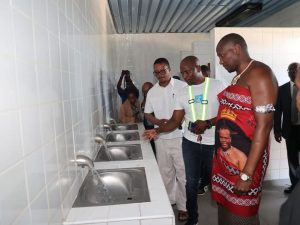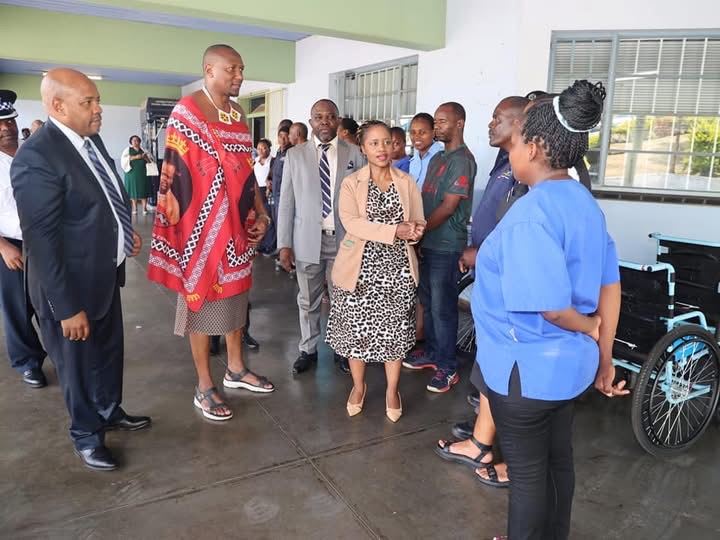By Siphesihle Dlamini
Prime Minister Russell Dlamini has declared that Eswatini will set a new benchmark for healthcare transformation in Africa within the next three years.
The premier’s vision for a revamped healthcare system emphasizes the government’s commitment to ensuring quality care for all citizens, backed by robust collaboration across all sectors.
“Together, we can achieve a healthcare system that truly serves the betterment of our Nation,” the Prime Minister said, emphasizing the need for unity and a concerted effort to overcome the challenges that currently hinder the country’s healthcare sector.
RELATED: Government condemns misinformation campaigns against Prime Minister
Dlamini’s statement comes at a time when Eswatini’s healthcare system is facing mounting pressures, from a shortage of essential medical supplies to the growing prevalence of non-communicable diseases (NCDs).
The Prime Minister made this announcement following a tour of four key healthcare facilities across the country.
His visit, aimed at gaining firsthand insight into the daily challenges faced by healthcare providers and patients alike, highlighted both the significant hurdles and the notable progress within Eswatini’s health sector.
The Prime Minister’s tour included visits to some of Eswatini’s most critical health facilities: the Mbabane Government Hospital, the Manzini Government Hospital, the National Psychiatric Referral Hospital, and the Central Medical Stores.
His visit revealed the persistent difficulties in the healthcare system, many of which stem from long-standing issues like inconsistent drug supply chains, bureaucratic procurement processes, and a shortage of vital medical equipment.

“Ensuring access to quality healthcare remains one of our primary mandates,” the Premier stated. The government, he said, remains deeply committed to tackling these challenges head-on, with a strong focus on creating sustainable solutions for the long term.
One of the most concerning issues identified during the tour was the inconsistent supply of essential medicines.
At the Central Medical Stores, for example, the Premier directed that a detailed report be submitted to Cabinet outlining the current measures in place to address the ongoing drug supply crisis.
He also emphasized the need for a foolproof system that guarantees a continuous supply chain, from the warehouse to the patient’s bedside, with zero tolerance for pilferage.
The Prime Minister also expressed deep concern over the inefficiencies in procurement processes, which continue to hamper the timely acquisition of critical medical equipment and medications.
“We need to create robust, transparent, and accountable systems that ensure the right resources are available when and where they are needed,” he said.
RELATED: Japan’s Prime Minister Kishida to resign, paving way for new leader
Despite the numerous challenges, the Prime Minister was quick to acknowledge the progress that has been made in certain areas of the healthcare sector.
Of note is the government’s initiative to provide free critical health services such as oncology and dialysis. These services, which are often financially out of reach for many emaSwati, have made a significant impact, offering hope and care to thousands of patients who might otherwise go untreated.
A noteworthy development highlighted during the tour was the innovative “Collect and Go” facility, which simplifies the process for patients who need to collect their medication.
This initiative has been praised for improving access to essential medications and reducing wait times, making it easier for patients to adhere to their treatment regimens.

“These advancements underscore the potential within our healthcare system to achieve even greater milestones,” the Prime Minister remarked.
He stressed that with sustained effort and strategic interventions, Eswatini’s healthcare system could become a model for other African nations.
However, one of the most pressing issues that emerged during the visits was the alarming rise in non-communicable diseases (NCDs) in the country.
According to the Prime Minister, a particularly concerning statistic is the number of cancer patients being treated at the Manzini Government Hospital.
Between 500 and 600 cancer patients are admitted each month, with 150 to 250 of those undergoing chemotherapy.
“This is a national emergency waiting to happen,” the Prime Minister said, adding that NCDs like cancer, diabetes, and hypertension are rapidly becoming one of the most serious public health challenges in Eswatini.
He suggested that it may be time for the government to declare NCDs a national emergency, like the successful interventions implemented in response to HIV and Tuberculosis.
The rising prevalence of these diseases has placed enormous strain on the healthcare system, which was originally designed to handle communicable diseases such as HIV and TB.
The Prime Minister called for a coordinated national response to address the growing burden of NCDs, which includes not only treatment but also a major focus on prevention and early detection.
The Prime Minister commended the Ministry of Health for its proactive approach in confronting these challenges.
“We commend the Ministry of Health for its efforts to confront these challenges head-on, as outlined in its strategic plan recently presented to Cabinet.”
Recently, the Ministry presented its strategic plan to the Cabinet, focusing on strengthening primary and preventive healthcare. According to the Premier, the plan lays out a roadmap for the country’s health sector, outlining the critical steps needed to tackle the system’s most pressing issues.
“I am particularly encouraged by the emphasis on strengthening primary healthcare and prevention,” Dlamini said.
He emphasized that by focusing on these areas, Eswatini could significantly reduce the burden on hospitals and clinics, while also improving the overall health outcomes of its citizens.
He further called on the Ministry of Health to continue exploring innovative solutions to meet the country’s healthcare demands.
“Innovation is key to ensuring that we can deliver the best possible care to every citizen, regardless of their location or economic status,” he added.


